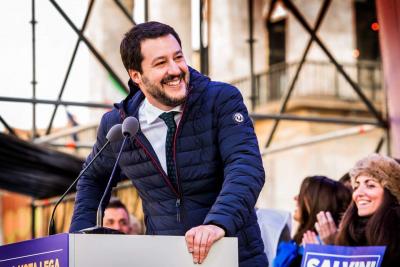Salvini dealing with left, Italians predict fresh elections

ROME – Silvio Berlusconi finally emerged after two days of silence following Forza Italia’s disappointing showing at the elections to say he was “happy” with the result, while his coalition partner, Matteo Salvini, made overtures to the left on Wednesday in the hope of becoming prime minister.
The octogenarian Berlusconi was the only leader not to give a press conference following the result with his party slipping into second place in the right-wing coalition after collecting only 14 percent of the vote.
Speaking to Corriere della Sera, the Cavaliere insisted that he “will remain the leader of Forza Italia,” adding, “I will be the director of the centre-right, I will be the guarantor of the competency of the coalition.”
He also looked to soothe some of the tensions that have bubbled away between Forza Italia and the League throughout the campaign, arguing that “the vote on Sunday was not a derby inside the centre-right.”
A new theme has emerged to explain the reasons behind the electoral slump for Berlusconi, who argued the party had been “deprived of its leader” given his disqualification from public office.
Both Forza’s leader and Matteo Salvini of the Northern League have claimed that the centre-right coalition should be President Sergio Mattarella’s first port of call in forming a new government. However, as the leading party in the coalition, the job has fallen to the League’s head to begin talks to construct a working majority in parliament.
“Whoever wants to support the League’s programme,” Salvini stressed, “we accept them.” A strategy similar to that of the Five Star Movement (M5S) who have likewise emphasised the priority of their programme for government in striking accords.
Salvini claimed he would “listen to all,” with Il Messaggero reporting that both Berlusconi and Salvini were hoping to woo the left into an agreement.
An agreement between Salvini’s brand of anti-immigration, euro-sceptic populism and the left still looks like an unlikely match and will also have to contend with Italy’s other leading political force, M5S.
Luigi Di Maio, M5S’s leader, returned to Pomigliano d’Arco, the area of Naples that he grew up in, to a rapturous reception from the crowd with yells of “you are one of us” and “don’t make deals,” according to Corriere.
A party atmosphere developed as Di Maio took to the stage alongside a number of fellow elected candidates, telling the crowd that “I felt the need to come to embrace you immediately, because here history was made.”
However, serious politics was also in the air. “Inevitably, we are projected to govern,” Di Maio announced, “not only because we are the first force, but because we are different from the others that are a territorial movement and claim the task; we represent the whole country.”
The party received a boost from business on Tuesday when the President of Confindustria, Vincenzo Boccia, stated that the party didn’t “create fear… we are talking about a democratic party,” highlighting that a party that won 32 percent of the vote had to be heeded.
According to IPSOS, the research and marketing company, 51 percent of Italians still believe that it will take new elections to decide the form of the government, with one in three believing a deal between the League and M5S is in the offing, according to Corriere.
Meanwhile, Economic Development Minister, Carlo Calenda announced he was joining the Democratic Party (PD), maintaining that Italy did not need new parties but needed the old ones to be renewed. Nonetheless, with talk of deals in the air, Calenda announced that he would “leave immediately if the PD is allied to M5S.”
Nevertheless, recriminations for the disastrous PD election result were being waged. Ugo Sposetti said recently resigned Matteo Renzi should be put on trial by the party, and that “the current leadership of the PD are not worthy to confront the debate on what the party will have to do now. They are unworthy.”
Sposetti also made it clear that he was one of the party’s few open advocates for a deal with M5S. “They have improved a lot in the last five years. They are not dangerous, nor have I ever considered them a danger.”
tw


